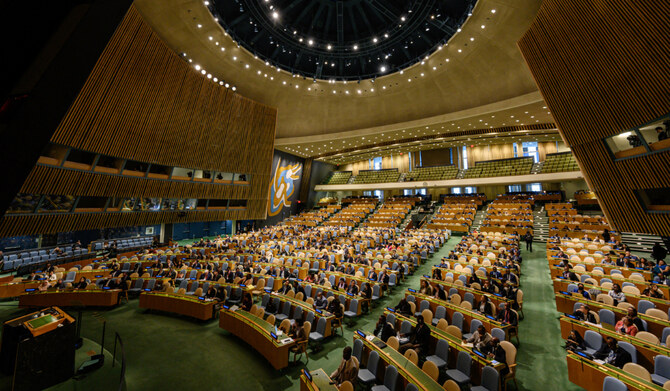UNITED NATIONS: The Palestinians have circulated a draft UN resolution demanding that Israel end its “unlawful presence” in Gaza and the West Bank within six months.
The proposed General Assembly resolution, which was obtained by The Associated Press, follows a ruling by the top United Nations court in July that said Israel’s presence in the Palestinian territories is unlawful and must end.
In the sweeping condemnation of Israel’s rule over the lands it captured 57 years ago, the International Court of Justice said Israel had no right to sovereignty over the territories and was violating international laws against acquiring the lands by force. It also said Israeli settlement building must stop.
Israeli Ambassador to the UN Danny Danon denounced the resolution and described it as a “reward for terrorism.” He called for the resolution to be rejected.
“Let it be clear: Nothing will stop Israel or deter it from its mission to bring home the hostages and eliminate Hamas,” he said.
UN Secretary-General Antonio Guterres told The Associated Press on Monday that International Court of Justice rulings “should be accepted and should be implemented.” As for the General Assembly resolution, he said, it’s up to the 193 UN member nations to make a decision.
The draft UN resolution comes as Israel’s military assault on Gaza enters the 11th month after being triggered by the Hamas-led attacks in southern Israel on Oct. 7 and as violence in the West Bank reaches new highs.
The proposal, if adopted by the 193-member General Assembly, would not be legally binding but the extent of its support would reflect world opinion. There are no vetoes in the assembly, unlike in the 15-member Security Council.
A council diplomat said the Palestinians are aiming for a vote before world leaders of the General Assembly start their annual high-level meetings on Sept. 22. The diplomat spoke on condition of anonymity because discussions on the draft resolution have been private.
The proposal demands that Israel comply with international law, including by immediately withdrawing all military forces from the Palestinian territories.
The draft resolution not only demands an end to all new settlement activity but the evacuation of all settlers and the dismantling of the separation barrier Israel constructed in the West Bank.
And it calls for all Palestinians displaced during Israel’s occupation to be allowed “to return to their original place of residence” and that Israel make reparations “for the damage caused” to all people in the territories.
Israel considers the West Bank to be disputed, the future of which should be decided in negotiations, while it has moved people there in settlements to solidify its hold. It has annexed east Jerusalem in a move that isn’t internationally recognized. It withdrew from Gaza in 2005 but maintained a blockade of the territory after Hamas took power in 2007.
Since the Hamas attacks on Oct. 7, Gaza’s Health Ministry says over 40,900 Palestinians have been killed there. It does not differentiate between fighters and civilians in its count. The war has caused vast destruction and displaced around 90 percent of Gaza’s population of 2.3 million, often multiple times.
Meanwhile, settler violence in West Bank has reached new highs, and Israeli military raids on West Bank cities and towns have grown more devastating, killing 692 Palestinians, according to the Palestinian Health Ministry. Attacks by Palestinian militants on Israelis within the territory also have increased.
Israel captured the West Bank, east Jerusalem and Gaza Strip in the 1967 Mideast war. The Palestinians seek all three areas for an independent state. The international community generally considers all three areas to be occupied territory.
Palestinian UN Ambassador Riyad Mansour told the Security Council last month that he planned to introduce a General Assembly resolution in September to enshrine the ICJ ruling. “We are sick and tired of waiting,” he said. “The time for waiting is over.”
The proposed resolution includes other demands, including for Israel to be held accountable for any violations of international law, sanctions against those responsible for maintaining Israel’s presence in the territories, and for countries to halt arms exports to Israel if they’re suspected of being used in the territories.
























